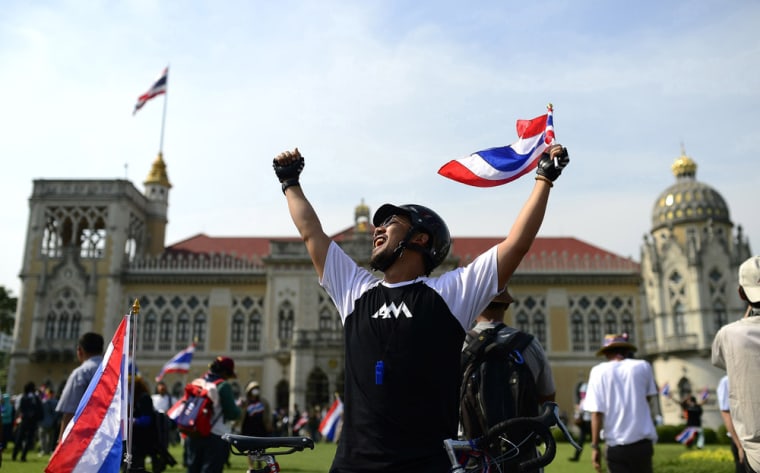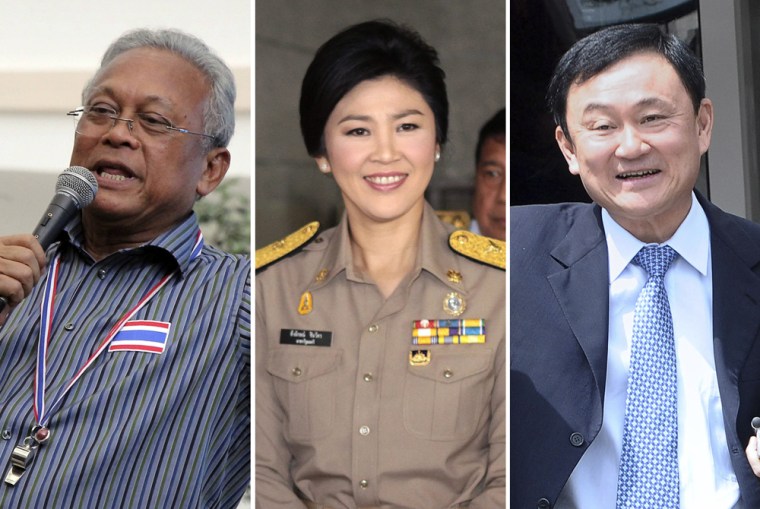
News analysis
The Thai protests turned a little surreal Tuesday, when after days of battling stone-throwing protesters with tear gas, water cannon and rubber bullets, the police abruptly changed tactics. They removed barricades and allowed protesters into the grounds of Government House and the city's police headquarters.
Protesters promptly declared victory, though there was no immediate comment from the government, which has said it wants to avoid violence and to defuse tensions.
To any visitor to Bangkok, the Thai capital can appear to have all the trappings of modernity, but politics can at times be medieval, and it is frequently what goes on out of sight, behind the scenes that really matters. This is one of those moments. And the key players in the shadows are the Royal Palace and its courtiers and the army, which professes loyalty first and foremost to the palace.

What we are seeing played out in Bangkok is not a "people's revolt," as protest leader Suthep Thaugsuban has described the last few days of unrest. His support is drawn broadly from Thailand's old royalist elite and the Bangkok middle class. In reality, the government still commands widespread support outside the capital, and would probably win any fresh election.
The numbers on the streets - perhaps 30,000 over the last couple of days - are well down on the early days of the protest. Suthep himself is an unlikely advocate of cleaning up government. A backroom deal-maker before he quit as a member of parliament for the opposition Democrat Party, he has come under scrutiny on a number of occasions, but has always denied any wrongdoing.
He is almost certainly just a figurehead.
The drama being played out in Bangkok is just the latest installment of a long-running saga that dates back to the 2001 election of brash millionaire businessman Thaksin Shinawatra as prime minister. He represents a new moneyed elite who's unashamedly used populism to empower the poor and construct an enormous and impenetrable vote bank in the north and northwest of the country.
Thaksin's rural support has ensured parties led by him, his brother-in-law and now his sister, have won a decade of elections. But his opponents attempted to overthrow all those governments, via a coup in 2006 and on other occasions through the courts - one pro-Thaksin prime minister being famously barred from office for moonlighting as a chef, since he was deemed to be inappropriately deriving income from a cooking show he hosted on TV.
Opponents have accused Thaksin of corruption, and say he bought off the poor with cheap credit, health care and wasteful subsidies. He is currently in Dubai (mostly) in self-imposed exile, from where he still wields enormous influence over his sister's government.
The trigger for the current protests was a proposed amnesty law that would have allowed Thaksin to return. It was defeated by the Senate and withdrawn in the face of the protests, which have evolved into the more sweeping demand for the government to go.
In the the eyes of Thailand's old elite, though, Thaksin's biggest crime has been through his populism to challenge the authority of Thailand's revered King Bhumibol Adulyadej. The king will be 86 years old on Thursday and is ailing. The question of what happens when he dies is not openly discussed in Thailand, constrained by strict lese majeste laws, but is critical for understanding the struggle for power in Thailand.
His passing and the removal of his immense authority - and all the power and hierarchy that flows from it - will be a serious blow to the old elite. His son and likely successor, who has been courted by Thaksin, is deeply unpopular in Thailand. The monarchy will be an immensely diminished, as will those who draw their authority from it.
Modernizers, including many critics of Thaksin, think that will be no bad thing, particularly if it means the country can work on improving its democratic institutions instead of looking to the army and the palace to intervene every time there is a crisis.
It seems that this time round, the army does not want to intervene openly. It accepts that the 2006 coup was a failure, and have said they are not taking sides this time round. But they are clearly playing a big role behind the scenes. The rather fuzzy demands of the protest leaders - for a committee of the great and good to take over the running of the country - sounds rather like what the army tried to impose in 2006 - though with dismal results.
Thailand's old elite appears nostalgic for the days when the farmers of the north and northeast were docile and happy with their lot, at the bottom of a paternalistic system under a revered monarch. They seem to think the current problems can be solved by simply stripping these ignorant masses of their right to vote, given they consistently vote the wrong way. That is wishful thinking of the most dangerous type.
Related: